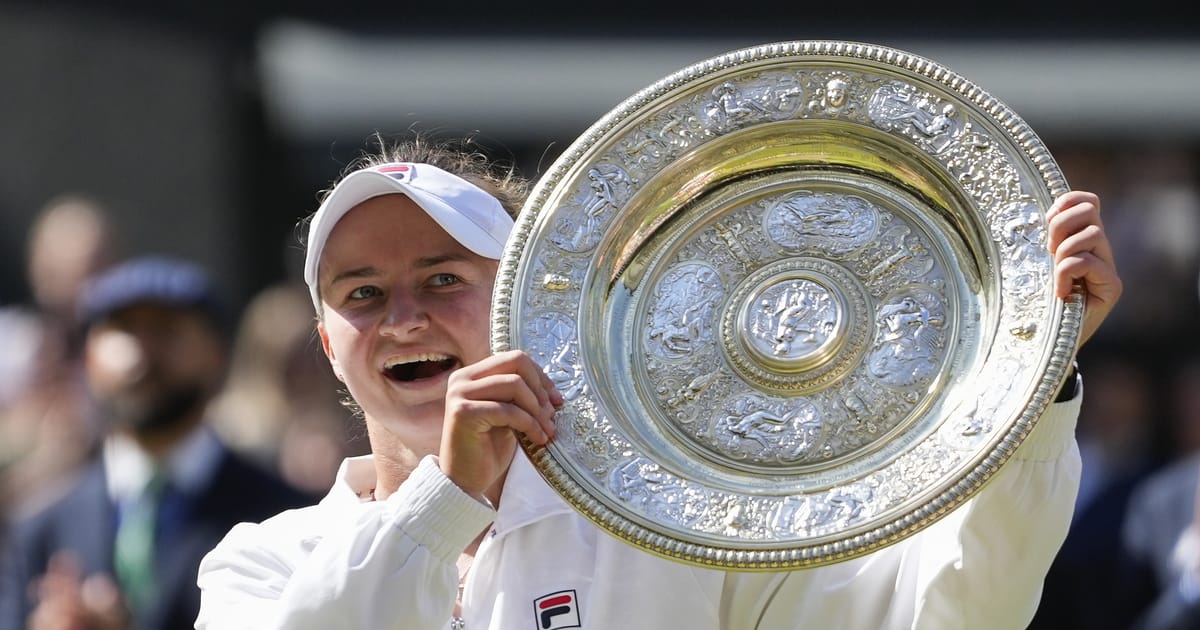Video of Thrilling final action | Siniakova/ Townsend vs. Dabrowski/ Routliffe | Final Highlights | Wimbledon



Barbora Krejčíková’s name flashed around the world on Saturday when she clinched the Wimbledon women’s singles title after a hard-fought, dramatic battle against Jasmine Paolini of Italy.
Krejčíková had previously won one singles Grand Slam, the French Open in 2021 – but said this was the best day of her life.
And she described her journey there to Czech Radio.
“A lot of good moments, as well as bad ones. A lot of mistakes and a lot of faith. It was a long and tough journey and I’m glad I handled it and showed how resilient I am.”
Krejčíková is the seventh Czech-born player to reach the women’s singles final at Wimbledon in the Open era, after Martina Navrátilová, Hana Mandlíková, Jana Novotná, Petra Kvitová, Karolína Plíšková and last year’s champion, Markéta Vondroušová.
But just how is Czechia, population 10.7 million, producing so many top players? That’s something I put to sports journalist Karel Knap.
“This question is being asked, I don’t know, 500 times a year during press conferences with Czech tennis players. Even some players ask what’s happening in your country, what do you eat, or what’s in the air in the Czech Republic.
“I think there are 10 possible answers. Number one is that tennis has a really great and deep tradition in the Czech Republic, in what was Czechoslovakia.
“We have had so many great players so it’s natural for girls, more than boys, to start to play tennis.
“For girls it’s the number one sport when they want to do something as children. Boys have ice hockey and football – they’ve got different choices – but for girls tennis is number one.
“That’s because it’s prestigious, because it’s really cool to play tennis; you can earn a lot of money if you’re really good.
“So girls, and parents, really have tennis as the number one choice for kids who want to do some kind of sport.”
Is there an unusually good network of clubs? Or are clubs affordable relatively affordable? Is tennis affordable for Czech families in a way that might not be the case elsewhere?
“I think that’s probably the number two point, yes. There are many clubs here in the Czech Republic, even in small towns. It’s not really difficult to start to play tennis.
“Many kids start to play with their parents in the clubs. They might start even without great ambitions, but when they are good there is a possibility to go up in the hierarchy.
“You can go from a small club to a bigger one in a bigger town. You can get to a big club or to the national centre in Prague or Prostějov – and you can go professional.”
Video of Thrilling final action | Siniakova/ Townsend vs. Dabrowski/ Routliffe | Final Highlights | Wimbledon
On Saturday of course Barbora Krejčíková won the women’s singles title in Wimbledon, and [former doubles partner Kateřina] Siniaková won in the women’s doubles. Last year we saw Markéta Vondroušová winning at Wimbledon. Is there a future generation coming along who can equal that kind of success? Are you aware of younger players coming through?
“If I could just go one step back, the third really important thing is the parents. In the Czech Republic there are many parents who are able to sacrifice their personal life, their family life.
“They are ready to invest money and time for the careers of their kids.
“And yes, I see many teenagers coming up and being great in their categories.
“For example, Tereza Valentová is a girl who won Roland Garros this year, the junior championship, and who is playing really great among the women, as well.
“And there are five or 10 other girls who are really, really, really good, all around the world, not just in Europe or this country – they are among the best at under 12, under 14, under 16 all around the planet.”
